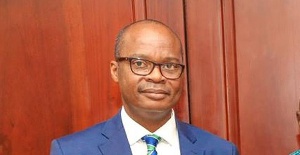 Governor of the Bank of Ghana, Dr. Ernest Addison
Governor of the Bank of Ghana, Dr. Ernest Addison
Governor of the Bank of Ghana, Dr. Ernest Addison, has said that the central bank is in no rush to announce the widely anticipated new minimum capital requirement for commercial banks operating in the country.
The governor, addressing his maiden Monetary Policy Committee (MPC) press conference last Monday said much as recapitalization of the banks is very necessary, the bank is acting in a cautious manner that would ensure banks are not plunged into similar crisis in the future.
According to him, “recapitalisation has become more necessary because of weak economic growth and weak credit management skills. These are the underlying problems that we are faced as a country and we have seen the spillover effects of that in terms of financial sector performance.
“It’s very easy to recapitalise without addressing the underlying problems that led to the recapitalization in the first place. We can easily recapitalise and badly manage things and then come back to square one and recapitalise again,” the central bank governor said.
Currently, commercial banks in the country are required to have a minimum stated capital of at least GH?120 million, a figure which bankers such as Frank Adu Jnr, Managing Director, Cal Bank, have argued should be hiked to a billion cedis as way of sanitising the banking industry.
Discussions about the new capital requirement have been ongoing for the past 12 months and there’s growing anxiety regarding when the announcement of the new requirements would be and how much it will be.
But Dr. Addison responding to a question on set timelines for the announcement of the stated capital, said: “If you look at it that way, I think that it is important for us to take our time not only in announcing what the new capital requirements are but we must be clear in our minds what we are trying to achieve with this whole process of recapitalisation.
We are still looking it regarding what this new requirement will be. We have taken our time because we think it is an important issue where we need to understand how much additional stress testing of the system can be done,” he added.
Nagging liquidity challenges
Banks in the country have struggled recently with liquidity as Non-Performing Loans (NPLs) have remained high across the sector. Several banks have had to write huge loans off their books, which has resulted in the shrinking of profits to historic low levels, and negative growth in some cases.
Although the NPL ratio recorded in February this year stood at 17.7 percent, a marginal decline from 18 percent recorded in January, 2017, the situation has worsened in comparison to the February 2016 performance of 15.6 percent.
The central bank, in its March 2017 Banking Stability report, noted that: “The high NPLs continue to pose upside risks to the banking industry, despite the marginal decline in the energy-sector related debt exposures.”
The increase in the NPL ratio over the one year period, the central bank said, was partly due to the downgrade of some loans by banks after its 2016 Asset Quality Review (AQR), with no commensurate increase in gross advances.
With the energy sector, including Bulk Oil Distributing Companies (BDCs), debts hanging like dark clouds above their heads, banks are struggling to stay afloat while doing their best to convince shareholders that there are better times ahead.
Even though the Bank of Ghana has stated that it will increase the stated capital of banks, industry watchers believe that if high NPLs are not tackled, the increment will have very little impact, if any, and further erode the little gains made by the banks.